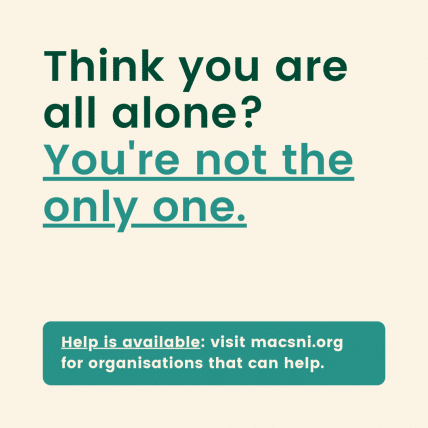
We are currently experiencing a mental health and suicide crisis, people don’t want to talk about their feelings (in particular young men). Opening up conversations with our friends, families, colleagues and support networks can be vital in preventing tragedies from taking place.
The strongest message for today is that having conversations can help young people overcome the sense of feeling entrapped by life. Talking, whether it be on the phone, in person or via text, is often life-saving. Providing a platform and a safe place to allow people to share their feelings by instigating a conversation is so important – even something as simple as telling a friend you’re there for them on the phone if they ever get to a dark place is vital.
Asking someone if they’re ok, is a question we ask each other every single day – it is one of the most important questions we can ever ask a friend. Find someone to talk to, be that person someone can talk to.
We want our young people to be happy and feel good about themselves, to be able to fight and not give up.
What to do if you’re feeling suicidal or think a loved one might be:
- If you’re feeling suicidal, and you don’t feel you can keep yourself safe right now, seek immediate help. Go to any hospital A&E department, or call 999 and ask for an ambulance if you can’t get there yourself. Keep yourself safe by removing any means of taking your own life while you learn how to cope with suicidal feelings.
- If you’re worried someone you live with might harm themselves, stay with them and help them get emergency help.
- Lots of people fear talking about suicide but speaking about suicide responsibly is important and doesn’t increase the risk that someone will take their own life. So continue to reach out – although it might not be possible to see loved ones face-to-face, regularly checking in – by text, email, phone or video call – can really help.
- If someone is feeling suicidal, reassure them that it is possible to do something to improve their situation in a caring and sympathetic way. It takes a lot for someone to say “I need help”, but it doesn’t hurt to raise the subject yourself. Sometimes you don’t have to explicitly talk about mental health to find out how they are doing– it can be as simple as texting them to let them know you’re thinking of them.
- If you can’t see loved ones in person, it might feel even more difficult to reach out for help. But any contact could help someone who is suicidal feel less alone, and there are organisations that can help which are open and there for you.
- The Samaritans provide a free, confidential, 24-hour phone support available by calling 116 123 or emailing jo@samaritans.org. You don’t have to be suicidal to ask them for help.
- For information, support and advice about mental health problems and where to get support, visit Mind’s website or call their Infoline on 0300 123 3393 (Monday to Friday, 9.00am to 6.00pm).
Potential signs someone is suicidal according to the National Suicide Prevention Alliance (NSPA):
- A change in routine, such as sleeping or eating less than normal
- Lacking energy or appearing particularly tired
- Drinking, smoking or using drugs more than usual
- Finding it hard to cope with everyday things
- Not wanting to do things they usually enjoy
- Becoming withdrawn from friends and family, not wanting to talk
- Appearing more tearful
- Appearing restless, agitated, nervous, irritable
- Putting themselves down in a serious or jokey way, for example ‘Oh, no one loves me’ or ’I’m a waste of space’
- Losing interest in their appearance, not liking or taking care of themselves.
If you feel someone might be in immediate danger, call 999, advises Laura Peters, head of advice and information at Rethink Mental Illness. “Samaritans are also available 24 hours a day, seven days a week on 116 123. It’s also advisable to go and see your GP, they will be able to identify support that’s local to you.”
Useful websites and helplines:
- Mind, open Monday to Friday, 9am-6pm on 0300 123 3393
- Samaritans offers a listening service which is open 24 hours a day, on 116 123 (UK and ROI – this number is FREE to call and will not appear on your phone bill.)
- The Mix is a free support service for people under 25. Call 0808 808 4994 or email: help@themix.org.uk
- Rethink Mental Illness offers practical help through its advice line which can be reached on 0300 5000 927 (open Monday to Friday 10am-4pm). More info can be found on www.rethink.org
